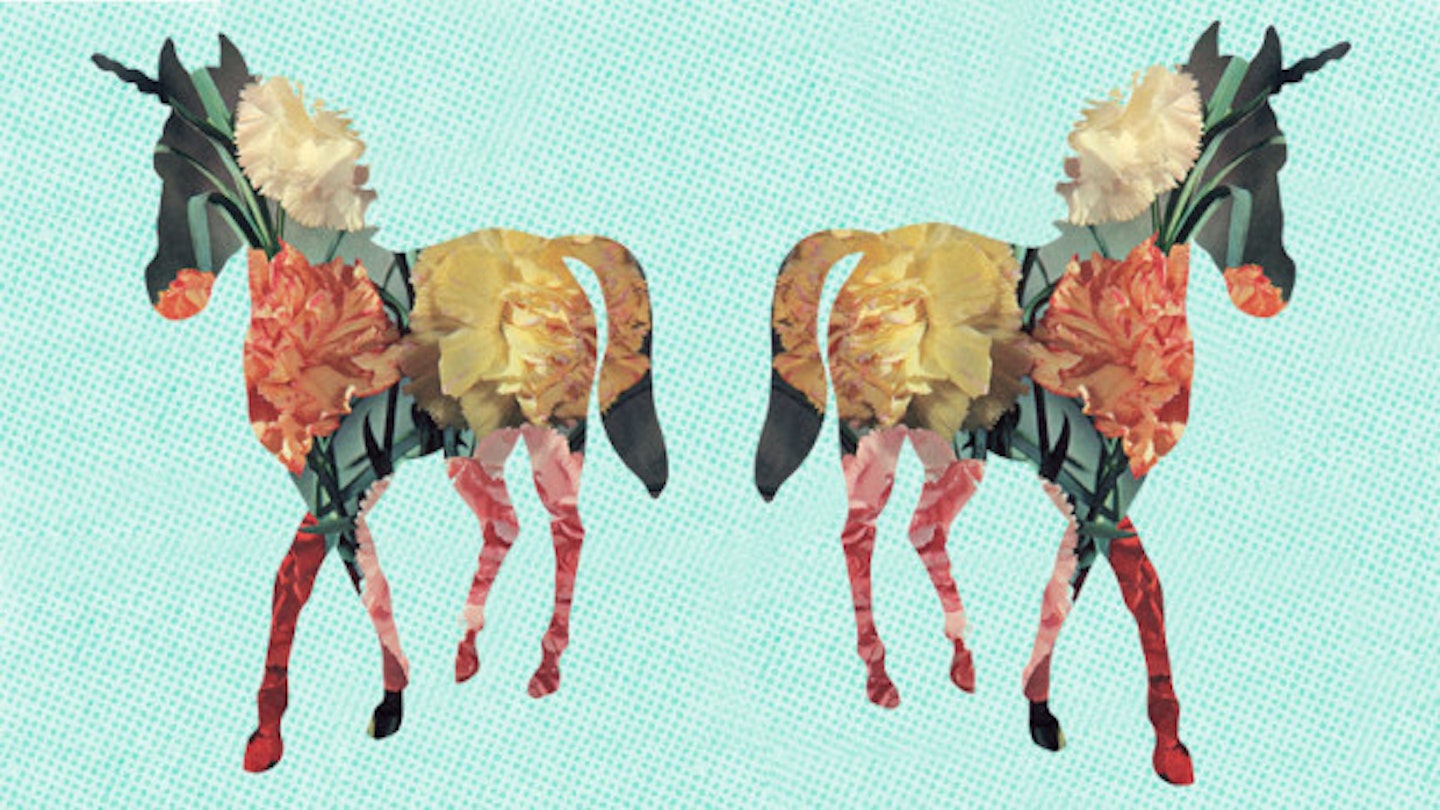Think unicorns don’t exist? Totally wrong, mate. They’re very real, and they’re living in north London.
New Vice documentary Unicorns follows around a fellow named Shaft and his pals who, as well as wearing glitter, horns and a lot of metallic latex, identify as ‘Unicorn’.
Shaft’s mystical life started when he was at (where else?) the Burning Man Festival – ‘That’s where I was born as a unicorn,’ he says in the film.
So, what’s it like to dedicate your life to being a unicorn? We spoke to the filmakers Matt Shea and Adrian Choa about what they found out...
So when did you guys first meet the Unicorns?
Matt: I met Shaft at the pub. He was wearing a unicorn shirt and he was so passionate. He had cooked up this whole complex dogma, and it was clearly more than just a joke or a phase. I got the sense that he actually needed the unicorn thing, in the same way some people need religion.
Adrian: And from there we met Shaft and Emma at his old house and went to Morning Gloryville (a pre-work rave). The combination of raving, yoga and daylight was something I hadn’t experienced before.
Would the Unicorns exist without him?
Matt: Some unicorns dispute that he’s their leader, but no one is as committed or as charismatic as Shaft. With or without him, the Unicorns are all driven by a common purpose – to gut everyday life of its banality. Unicorn theology is a kind of glittery evangelism rooted in a fear of the mundane. They’re ‘spreading the sparkle’ against the darkness of the real world, and it’s not just Shaft who fears that darkness.
Wow. What are they escaping from?
Adrian: They do acknowledge that donning a costume is a form of escapism from the monotony of London life. But at the same time, their costumes are an invite to the people around them rather than merely a form of self-exiling. Sammy [one of the Unicorns] says that when she puts on bright colours and glitter, it’s an invitation to a conversation.
Some Unicorns say they are ‘full blood’. What does that mean?
Adrian: Shaft has created an entire mythology of ‘Unicornia’, which involves continuous evolutions to different levels – although he says there’s no hierarchy! Off the top of my head, I know that the first stage is to be a ‘trashicorn’, which is a wasteman or a wreckhead.
You can also be a ‘pure blood’, which suggests a certain innocence or naivety. Then, if you’re lucky, you can be a ‘warriorcorn’, a breed who have suffered through the darkness and have emerged in a cloud of enlightenment.
Shaft has progressed past this and is now a ‘tantricorn’, actually holding private tantric sex tutorials during the week.
So is that where the whole polyamorous thing comes into it?
Matt: Relationships hurt. Shaft saw polyamoury as a solution. His ‘born again’ moment came during the Burning Man Festival, which is characterised by sexual experimentation. But like many people who flirt with polyamoury, they end up realising that it’s difficult to pull off – even with an entourage of hedonistic Unicorns at your feet.
Shaft used to be an alcoholic. Has he become more focused on the unicorn life since he stopped drinking?
Adrian: Shaft has always been a Unicorn. But he’s certainly become more focused on new-age forms of healing to combat his previous addictions. Tantra and Kundalini yoga seem to be the new tonics. And the Wizard, of course.
Shaft now holds ‘physical meditation’ sessions instead of the ‘bed parties’ (cat videos and ketamine) he used to have. What goes on there?
Matt: I’ve personally never tried DMT, partly because I’m afraid that when I wake up I’ll think I’m a mythical creature – but having Shaft there would probably make it fun. He kind of diverts all of the awkwardness in the room towards himself and makes you feel comfortable.
Adrian: I mean the Unicorns come out of those sessions on a definite high. The one form of meditation which has so far not worked for Shaft is ‘OMing’, a practise he describes as ‘finger-banging yourself to enlightment.’
Do they get a lot of hate walking down the street?
Adrian: It really depends on what part of London they’re in! I know Shaft is afraid to walk around in those garms around his Tottenham stomping grounds, but when they walk around Camden, they get high fives and applications to join. Online there are a lot of trolls, of course, but I think Shaft thrives off it.
Are there other groups of people that live as mythical creatures, thanks to Burning Man?
Adrian: Oh yes, there’s an entire subculture of ‘mythicals’, ranging from mermaids and fairies, to vampires and clowns.
What do you think the future holds for the Unicorns?
Matt: Unicornism was ‘born on the Playa’, meaning that it really stems from Burning Man and that whole hedonistic festival ethos. As that hedonistic culture grows, we may see more and more groups like the Unicorns who try to carve out some kind of spiritual, ethical existence from the frivolity of aimless partying.
Our generation is too hungover to create any meaningful spiritual discourse, so groups like the Unicorns will move in to fill that void.
Read more about the Unicorns here.
Like this? Then you might also be interested in:
Amy Winehouse Documentary Being Shown To Juvenile Offenders In Thailand
‘It’s A Male Dominated Industry.’ The Stars Of Blood Moon Talk Representation Of Women On Film
Oscar Season’s Nearly Here. Here’s The Films You’ll Be Wanging On About From Now Until March
Follow Jess on Twitter @Jess_Commons
This article originally appeared on The Debrief.
